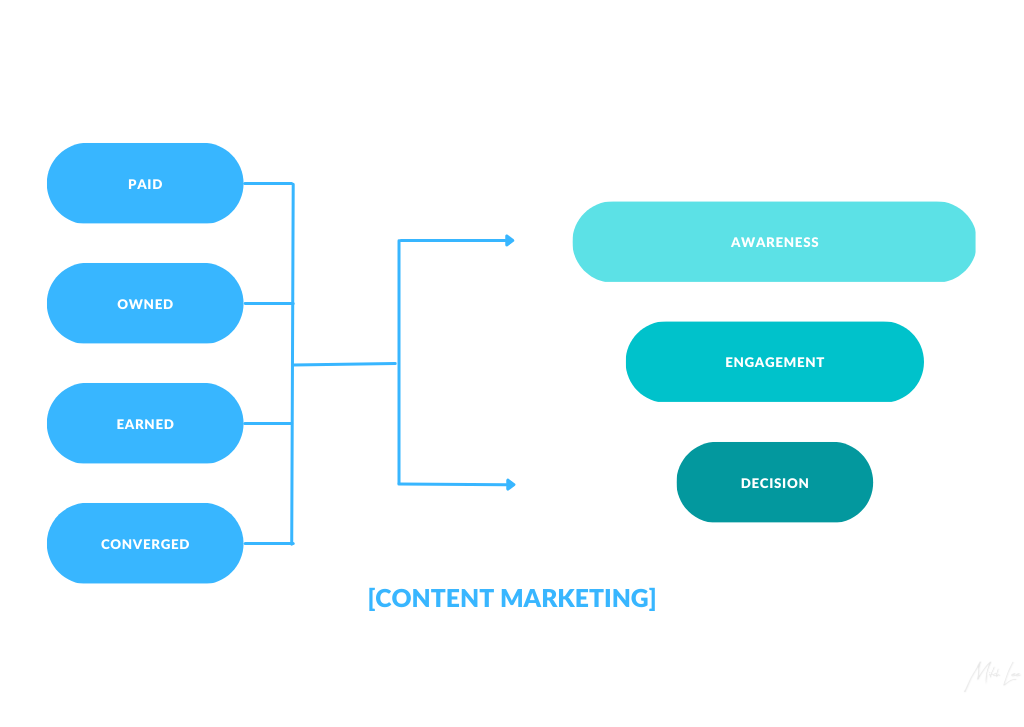
Content Marketing is Important for Startups (BC It’s Just Marketing)
A fine-tuned bow needs an arrow.
The bow is your marketing medium.
The arrow is the content.
The arrow’s shaft, the fletching, the nock, and the arrow point must all be carefully crafted to pierce and capture the market.
Content marketing is the culmination of the marketing channels where you engage and the content you produce.
You have “how-tos” to lead suspects closer to your solution.
Sweepstakes, lead magnets, and newsletters engage your audience.
Product pages, pricing, and spec sheets help customers make a decision.
User forums, updates, and surveys retain customers.
All of those are fueled by traffic from your marketing channels.
Content marketing is important for startups because it strategically places relevant content in a prospect’s path, leading them towards purchase.
The Content Marketing Funnel
 Content marketing funnels are endless in description.
Content marketing funnels are endless in description.
Some folks use top/middle/bottom.
Others use attract/convert/close.
The combination of these run forever.
I use awareness/engagement/decision.
- Awareness: when a prospect becomes aware of a problem or need. Prospects begin searching for solutions at a fundamental level. Your job is to get in front of them rather than offer a solution. But instead, simply answer their questions. You want to get in front of them before anyone else. They’ll recognize you for the rest of their journey.
- Engagement: in this stage, prospects will engage with different solutions. Some of these solutions will not be in your industry. The prospect is still deciding what kind of solution best fits them. Your job is to show them how your solution will help. Gaining their trust is the name of the game here.
- Decision: after reviewing a host of solutions, the prospect will decide. They will determine what type of solution best fits them. You’re almost there if you’ve built trust up to this point. Your job is to provide social proof and assurance that your solution works. It will encourage the prospect to take action.
Keep in mind, a prospect may jump between stages at any point. It’s the nature of the customer journey.
Here is an example of a customer search journey:
Jane wants to learn how to save money.
She researches solutions.
Some of the solutions presented are budgeting, CDs, high-yield savings accounts, and minimalism.
All different solutions, but they all help Jane save money.
From here, the path splits and favors the one with the most appealing content.
If you’re a bank, your content marketing starts with “how to save money”.
If you sell budgeting software, your content starts with “how to save money”.
If you’re a minimalist coach, your content starts with “how to save money”.
Content marketing begins broad but narrows at lightning speed. Against gigantic competitors, the battle is typically won at the top of the funnel.
When a prospect gets to the bottom, they’re already leaning towards one brand and one solution.
Developing a Content Marketing Plan for Your Startup
This is really a subjective portion of the article.
Your content marketing plan depends on your budget, growth goals, audience, objectives, and the works.
With that in mind, here’s a tip.
If you need customers fast, develop more decision-based content and send paid traffic to it.
When your CAC gets too high, start developing more awareness and engagement-funnel content. Use owned and earned channels to send traffic here.
If I were you, I’d spend a large chunk of my budget on building content and equity for owned and earned channels.
Why?
Because there are little to no ad costs.
You’ll spend resources developing them and building equity for them. But after that, it’s generally cost-free (for example, you don’t have to pay ad costs to send emails to your own email list).
Perfect for the upcoming recession IMO.
Measuring Content Marketing Success
Look, I’m not going to BS you and say there’s a way to “measure” content marketing.
Content marketing is just marketing. I don’t know who coined the term (probably CMI to be honest), but it’s literally just marketing. Sure there are frameworks that could help guide the type of content you write, but that’s also true for marketing in general.
Someone marketed “content marketing” and made it a thing.
Regardless.
You measure the success of the channel paired with your content.
If you have low conversion rates, high costs, or horrible KPIs, turn it off and use another channel.
Or create content that converts on that channel.
You won’t know if the channel is weak or the content is bad unless you test it.
Challenge Yourself to Think Critically About the Funnel
If you want to sustain your startup or business when the budget runs dry, rethink how you make content.
Most startups ONLY do decision-funnel content.
What happens when they run out of money?
New customers stop showing up, that’s what.
- Looking at all of the content on my website, what funnel does my content land in most?
- Do I need more awareness content?
- Do I need more engagement content?
- Do I need more decision content?
- What kind of content do my competitors have?
- What is the ratio of my and my competitor’s awareness/engagement/decision content?
- Do I have workstreams set up to support content in different funnels?
Content marketing is essential for startups. That’s a fact. But behind the fancy name, it’s just marketing.
A winning marketing plan on how to market your startup online will handle most of it for you.
I have a decade of experience generating millions of clicks and hundreds of thousands of leads for F100s and startups. Throughout that time, I’ve systemized the growth tactics and frameworks I used to streamline startup marketing success. If you’d like tactics and systems for success, please subscribe to my newsletter!
-Mitch

